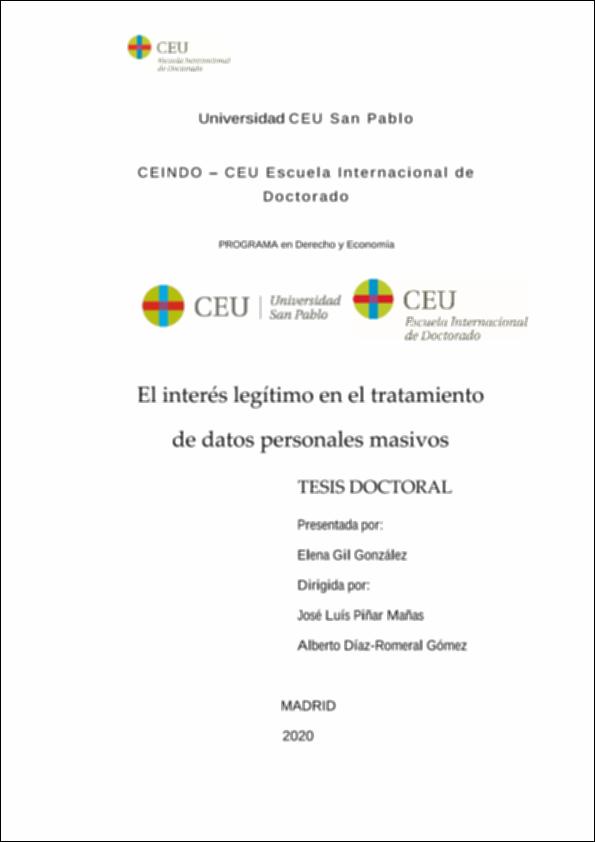Please use this identifier to cite or link to this item:
http://hdl.handle.net/10637/13021El interés legítimo en el tratamiento de datos personales masivos.
| Title: | El interés legítimo en el tratamiento de datos personales masivos. |
| Authors : | Gil González, Elena |
| Keywords: | Datos personales en internet.; Consentimiento.; Interés legítimo.; Big data.; Datos masivos.; Inferencia.; Ponderación.; Base de licitud.; Consent.; Legitimate interests.; Massive data.; Inference.; Balancing exercise.; Lawful basis. |
| Abstract: | Este trabajo analiza los efectos sobre la privacidad de las personas y sus datos
personales que genera la recolección, análisis masivo de datos y su uso para la
toma de decisiones.
En concreto, analiza la figura del consentimiento, uno de los instrumentos
principales para el ejercicio de control por parte de los interesados. Sin embargo,
el consentimiento presenta diversas limitaciones en entornos digitales
complejos, caracterizados por la impredecibilidad de los resultados que la
analítica de datos arroja, y por tanto, la dificultad para consentir o autorizar
tratamientos no conocidos o comprendidos.
A continuación, se realiza un análisis profundo de la figura del interés legítimo
en el marco del art. 6.1.f) RGPD. Este recibe fuertes críticas debido a la
ambigüedad de la redacción del precepto. La tesis responde a estas críticas
aunque también identifica algunas identifica limitaciones.
Concluye que se trata de una alternativa sólida a considerar en entornos de
tratamientos masivos de datos o big data.
Por último, se analiza el interés legítimo en relación con el derecho de
oposición, información, acceso, portabilidad y la toma de decisiones
automatizadas.
Con todo ello, se realiza una propuesta de bases de licitud y se propone una
guía de buenas prácticas para aplicar los preceptos analizados. This work analyzes the effects on the personal data rights of individuals, generated by the collection, big data analysis of and its use for decision making. Specifically, it analyzes the figure of consent, one of the main instruments for the exercise of control by data subjects. The consent model presents several limitations in complex digital environments, characterized by the unpredictability of the results that data analytics yields, and therefore, the difficulty to authorize treatments that are not known or understood. This is followed by an in-depth analysis of the figure of legitimate interest under art. 6.1.f) GDPR. This precept receives strong criticism due to the ambiguity of the wording of the precept. The thesis responds to these criticisms although it also identifies some limitations. It concludes that it is a solid alternative to be considered in environments of massive data processing or big data. Finally, the thesis analyzes the legitimate interest in relation to the right of opposition, information, access, portability and automated decision making. With all this, a proposal of lawfulness bases is made and a guide of good practices to apply the analyzed precepts is proposed. |
| Description: | Tesis-CEINDO, Universidad San Pablo CEU, Programa en Derecho y Economía, leida el 12 de mayo de 2021 |
| Director(s): | Piñar Mañas, José Luis |
| URI: | http://hdl.handle.net/10637/13021 |
| Rights : | http://creativecommons.org/licenses/by-nc-nd/4.0/deed.es |
| metadata.dc.date.endEmbargo: | 2024-05-12 |
| Issue Date: | 22-Sep-2021 |
| Center : | Universidad San Pablo-CEU |
| Appears in Collections: | Derecho y Economía |
Items in DSpace are protected by copyright, with all rights reserved, unless otherwise indicated.


